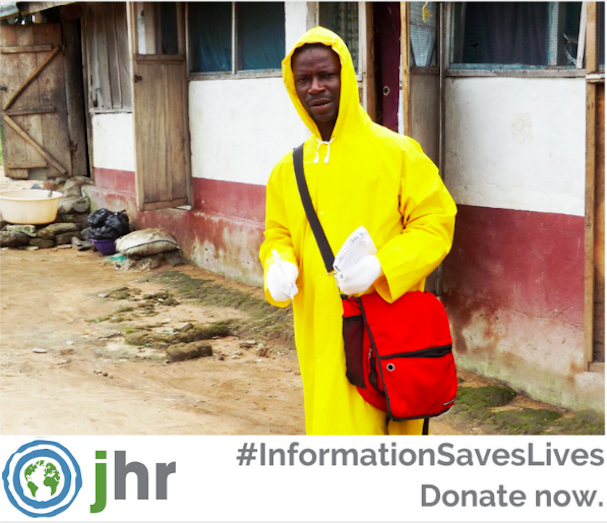Unprecedented.
That is the word people use, time and again, to describe the historical moment we are living through with Covid19.
And yet we are all navigating it, as best as we can. For amidst the grim daily statistics and stories of tragedy, there is heroism, even joy. And there is a future. We will get through this.
Journalists for Human Rights is busy pivoting all our resources, everywhere we work, to fight this disease. YOU can help us do this and support local journalists by becoming a monthly donor or contributing here.
Team JHR is no stranger to fighting pandemics. Our weapons of choice ? Community radio, social media, webinars. Information. Taking a human rights-based approach, we will work with journalists to ensure the information people need to survive is easily available, while fighting the fog of misinformation that accompanies such a disease.
Why is this so important ? In a pandemic, having access to the right information saves lives.
Local trainee-turned-humanitarian hero Kolubah Akoi, above, fought Ebola through 2014-2015 at the pandemic’s epicentre in Lofa County, Liberia, armed only with rubber boots, makeshift hazmat gear and a Facebook account. He posted daily updates of how to keep yourself safe, where to go to get help, and how to safely care for both the living and the dead. For his efforts, he was recognized with an African Union humanitarian award. Watch our website for more from Kolubah this weekend.
Media literacy trainer Amara Bangura and senior JHR South Sudan trainer Mustapha Dumbuya ran coverage of Ebola across 40 radio stations in Sierra Leone. Their task: to debunk rumours and myths that were putting people at risk, keep people informed about the pandemic, while giving them real hope through prioritizing stories of survival. For more on lessons they learned through that fight that are applicable to Covid19, please check out my joint op-Ed with them in the Toronto Star here.
Just last year, JHR DRCongo country director Prince Murhula led a network of journalists fighting a wave of deadly misinformation about Ebola in eastern DRCongo. As Prince writes in this blog post, the last Ebola patient was discharged from a clinic in Beni on the very same day the first Covid19 patient was confirmed positive in Kinshasa. La lutta continua.
What all these brave journalists know- intimately- is that in a pandemic, access to the right information saves lives.
They also know that sharing the wrong information can kill.
That’s why, on recognizing the scope of the danger we all face, Journalists for Human Rights immediately swung into action.
Countering Disinformation
Working with Canadian Heritage, we pivoted our program fighting misinformation in Canada, working with 20 of Canada’s finest journalists, misinformation and media literacy experts, trained by CIVIX and Craig Silverman of Buzzfeed, to focus on the pandemic.
Our trainers, including the aforementioned Amara Bangura, are running free online webinars Canada-wide throughout April to help you cut through the fog of confusion about Covid19 online and find the facts that will help keep you safe. For more info, or to check out a webinar: www.jhr.ca/truth-matters
Indigenous Community Media
The first Covid19 case emerged this week in Eabametoong, one of the remote First Nations in northern Ontario where JHR has worked. The risk to remote communities, most of which have no hospital in-community, cannot be overstated. So we are working with our Indigenous and First Nations partners and funders to pivot our programming across the Indigenous Reporters Program to tackle Covid19.
Over the coming months, we will be connecting emerging Indigenous journalists to news organizations wanting to amplify the urgent needs of First Nation, Métis and Inuit communities and sharing their stories, while supporting local reporters and in-community media to share the information people need to keep themselves and their families safe.
Global Covid19 Public Health Information
Of course, as the Minister of International Development Karina Gould put it last week, a global crisis demands a global approach.
And so we are also working with Global Affairs Canada to pivot our programs from South Sudan to DRCongo to Syria to Mali, fighting the crisis – with information and facts, taking a human rights-based approach, delivered through trusted local journalists.
As Kolubah, Amara, Prince and Mustapha can tell you, this is difficult work. It requires smarts, tenacity, a relentless positive outlook in the face of the grimmest possible news, navigating the crazy constraints of working on the front lines of a highly contagious disease. Above all, it takes courage.
It must be done. And we can’t do it alone. Please join us !
Given the scope of the challenge just getting underway, particularly in Africa and the Middle East, we are going to need every single one of you, all those who support us and our work, to step up in some way over the coming three months.
If you have the means, please give – either a one-time gift or, better yet, sign up to be a monthly donor .
Your money will help ensure the information people are getting, both in your city and in a displaced persons camp in South Sudan, is credible and accurate. That information will save lives.
If you can’t give, consider becoming a @jhrnews digital ambassador. Follow our social media https://twitter.com/jhrnews and https://www.facebook.com/jhrnews/ and share our efforts widely.
This is an unprecedented moment. This is the most dangerous moment we, as a global society, have yet had to face. We at @jhrnews are going to give it everything we have, working to ensure people have the right information to stay safe.
Please join us, and help us ensure #InformationSavesLives – worldwide.
Thank you
Rachel Pulfer
Executive Director
Journalists for Human Rights





